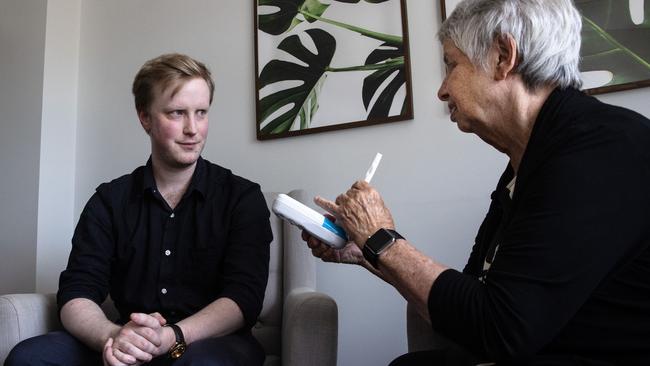Young vaper Alex tested nicotine levels in his body — the results shocked
Nicotine levels in vapers’ bodies are being tested with an Australian-first device at a clinic in Sydney. The results are shocking.

Alex Mobberley is sucking on a plastic stick with a small sponge at one end that is absorbing his saliva. The device, similar to a Covid rapid antigen test, is the only one of its kind in Australia and is designed to test nicotine levels in the bodies of those who vape.
As the 25-year-old places the sponge into a solution of reagent, it’s the moment of truth. Within a few minutes the results are clear: his nicotine levels are off the charts. He’s in the dark red, measuring in the highest possible zone. To put it in context, if he had been smoking a packet of cigarettes a day and taken this test, the nicotine levels likely would have been only half as high.
“It doesn’t surprise me, unfortunately,” Mobberley says. “I didn’t sort of know how high vapes were in nicotine until I went overseas fairly recently, to a country where vapes are very hard to get, and I was smoking cigarettes nearly constantly and I was still craving nicotine despite that. With levels this high in my body it just can’t be good.”
Respiratory physiologist Renee Bittoun knows all too well how true that is. The lead clinician at Australia’s first vaping cessation clinic, at Ramsay Clinic Northside in Sydney, Bittoun says almost every vaper she tests with the device she had made in Hong Kong returns red-line readings, the same as Mobberley. Worse, she’s hearing increasing reports from her colleagues in emergency medicine of teenagers addicted to vaping presenting to hospital in cardiac arrest.
“We’re certainly seeing young people have abnormal reactions in their heart, funny responses,” Bittoun says. “Sometimes it’s called syncope, where they just faint.
“In emergency departments, there are more and more young people coming in having had these sorts of aberrant heart rhythms because of these really high doses of nicotine. The high levels and the shots of nicotine that you get from vaping really react with the vasculature, with the lungs and the blood vessels and the brain, to give you those extraordinary effects that are really very sharp.
“I know of one case in which a 14-year-old had a cardiac arrest at home and the family did not know why, mum just heard him fall on the floor, and she started CPR and called an ambulance. The ambulance came, rushed in; the child had had some sort of heart attack. An otherwise perfectly healthy young person was put in the ambulance and had another (attack) that was recorded with ECGs as a heart attack. In the emergency department they couldn’t work out why. It was only later on when the family group was sitting together with the doctors to discuss his discharge that one of the family members, a young brother, said: ‘Was it because he vaped?’ And the parents said: ‘What’s vaping?’ They had no idea. And they went home and found the vape on the floor in his bedroom.
“I don’t think this is an isolated case. From what I understand from emergency departments, it’s not all that unusual. We’re certainly worried.”

The anecdotal reports are adding up. Leaders at the Heart Foundation and the Victor Chang Cardiac Research Institute both say they have heard reports of acute heart attacks in young people who vaped.
“More and more we’re hearing about this, and I think it probably parallels the dramatic uptick that we’re seeing in rates of Australian children and adolescents vaping,” says Jason Kovacic, a cardiologist and chief executive of the Victor Chang institute. “All the indicators are that this is a very, very bad situation.
“There are multiple possible reasons someone with acute vaping or acute combustible cigarette smoke can have a cardiac arrest. Within minutes it increases blood pressure, increases parasympathetic tone, it increases vascular stiffness, it reduces the function of the cells in the blood vessels. So if someone was in any way predisposed to cardiovascular problems or had other issues, that could just be the thing that tips them into cardiac arrest.”
Heart Foundation chief executive Garry Jennings, who is also a cardiologist, says heart attacks being increasingly reported in otherwise healthy young people who vape are strongly suspected by Australian clinicians to be caused by the devices.
“We’re hearing talk amongst my cardiology colleagues about the fact that they’re seeing more young people with heart attacks than in the past and in some cases they seem to be related to vaping. There are some published cases in the literature and some of them are in the very young teenagers and people in their early 20s.”
These reports, along with instances of severe acute lung injury, are acute cases caused by short-term exposure and often in young people with underlying vulnerabilities. But doctors suspect that as time goes on the effects of vaping on the heart and lungs will become clear, just as it took decades for the true dangers of cigarette smoking to emerge.
Speaking with Bittoun in her North Sydney clinic, Mobberley is hearing for the first time the real story of what vapes are doing to his body. He has tried to get information before but it has been hard to find and there are so many conflicting messages. What he does know is that the addiction that steadily tightened its grip after he first picked up a vape is extremely difficult to combat.
“If I wake up in the middle of the night to go to the bathroom, I’ll hit the vape,” he says. “When I wake up in the morning, I’ll hit the vape within the first five minutes. When I walk out from work at the end of the day, within 30 seconds I’m hitting the vape; 30 seconds after I go out for lunch, if I go downstairs to get a coffee while I’m at work, I will hit the vape again.
“Either you’re in a position where you can and you are hitting it so often that it doesn’t even register, or you’re kind of counting down the seconds until the next opportunity you have to hit the vape.
“I’d say that we haven’t really seen the impacts of vaping yet. Because I think the thing about vaping that’s kind of new in comparison to smoking is how bad it is as an addiction. “Compared to smoking, you can only smoke outside generally, whereas with vaping it is just so easy to do it all the time wherever you are. It’s easy to have no idea how much of it you’re consuming.
“I would like to, if I could click my fingers, go back in time and never do it. I would do that in a heartbeat, but I’m a bit hesitant about the amount of sacrifice that’s involved in quitting from where I am now.”

Australia is flooded with illegally imported, extremely high-nicotine, highly flavoured, disposable vapes containing a cocktail of dangerous chemicals. The federal government has introduced legislation to ban the import and sale of the devices, and Bittoun says the laws are having an impact primarily because young people can no longer afford the black-market vapes that immediately increased in price after the bans. The first major report to publish data on vaping rates post the Federal government’s legislation – research published this week by the Cancer Council’s Generation Vape project – found an increase in young people who had never vaped, a big decline in vape purchases, a decline in smoking and an increased awareness of vaping harms.
However vapes are still easy to get in most convenience stores, and pharmacies are declining to stock and prescribe therapeutic vapes, which were supposed to be one of the planks of Australia’s vaping cessation strategy.
As well, many people don’t know where to turn to find help quitting and are confused about vaping harms.
“I definitely do wonder, and I do try and keep up with the research that’s coming out,” Mobberley says. “But I’m not a doctor, you know. I can read the latest study out of Oxford, but the reality is that I just don’t understand it. And when you go online and you Google stuff, it’s very, very hard to just sort of do your own research on that sort of thing.”
Bittoun initiated Australia’s pioneering smokers’ clinic in 1979 and has dedicated her career to smoking cessation. She now sees vapes as the stalking horse undoing Australia’s world-leading progress in tobacco control. She says the dangers of the devices are only beginning to become clear.

“When you’re inhaling something into your lungs, be it cigarette smoke or any other sort of smoke or vape, it’s not benign,” she says. “It’s not water vapour. The vape from vaping contains nicotine, of course, and flavourings, which are really very bad for the lining of the lung and the upper airways, and other components we’re not always aware of that are also really very detrimental to the lining of the lung.
“Then when material gets in through the bloodstream, through your lungs, into your body, there are other prospective concerns, particularly the cardiovascular ones. The high levels and the shots of nicotine that you get from vaping really react with the vasculature, with the lungs and the blood vessels and the brain, to give you those real, extraordinary effects that are really very sharp.
“The cardiovascular effects are getting more and more reported on now. I’ve seen recently in material that’s just becoming probably the No. 1 caution that we’re now looking at is not so much the breathing-in one, it’s the vascular ones, the heart ones.
“We don’t have that capacity to break down the material that you might be inhaling into the lungs, like these flavourings. The dangers might be to the actual cell structure of the lining of the lungs. These are called cytotoxic chemicals because they’re not meant to be inhaled. Toxic means lethal. The questions we are asking are: does it break up the cells? Does it affect, say, the hairy cells that we have in our lungs, which are meant to waft up rubbish, which is natural and normal? Does it break down the capacity to waft up rubbish? Yes, it does. It looks like the cells don’t work properly doing that and it might mean some mutations of those cells.
“We work on what’s called the precautionary principle. We would rather say: let’s not do this, than say: let’s wait and see what happens. It’s all very suspiciously looking nasty for a long-term user.”
Bittoun is passing on her top evidence-based tips for those who want to quit vaping. They include:
- Getting up to do a short burst of exercise every time the urge to vape strikes.
- Sucking on a jelly bean or other lolly, especially after meals.
- Diversional activities such as fidget spinners.
- Reducing caffeine and alcohol, which stimulate the urge to vape.
- Instituting a vape-free home.
- Visualisation of what you are trying to achieve.
- Using nicotine replacement therapy.
- Using temptation therapy in which, instead of avoiding tempting situations, you confront them, learning how to behave without immediately resorting to using a learned paired substance as a response.
- Drawing on the support of Quitline.
For Mobberley, seeing the stark reality of the nicotine levels in his blood and hearing a detailed explanation of what vapes may be doing to his body has galvanised his inclination to try to quit.
“I expect there’s going to be a lot of sleepless nights,” he says. “But this has been a wake-up call. I really just don’t think vaping is going to turn out to be good for the characters and the lives of the people who do it.”





To join the conversation, please log in. Don't have an account? Register
Join the conversation, you are commenting as Logout